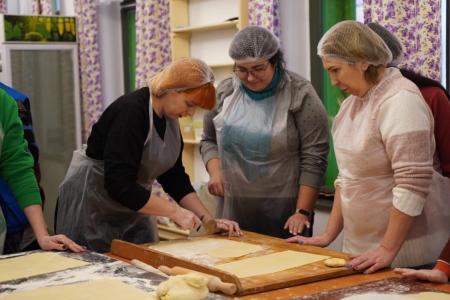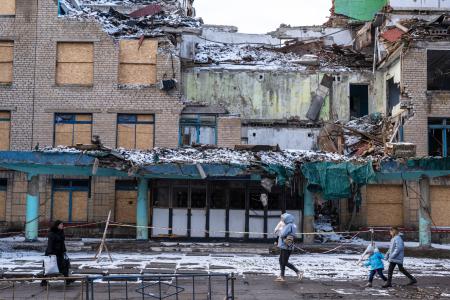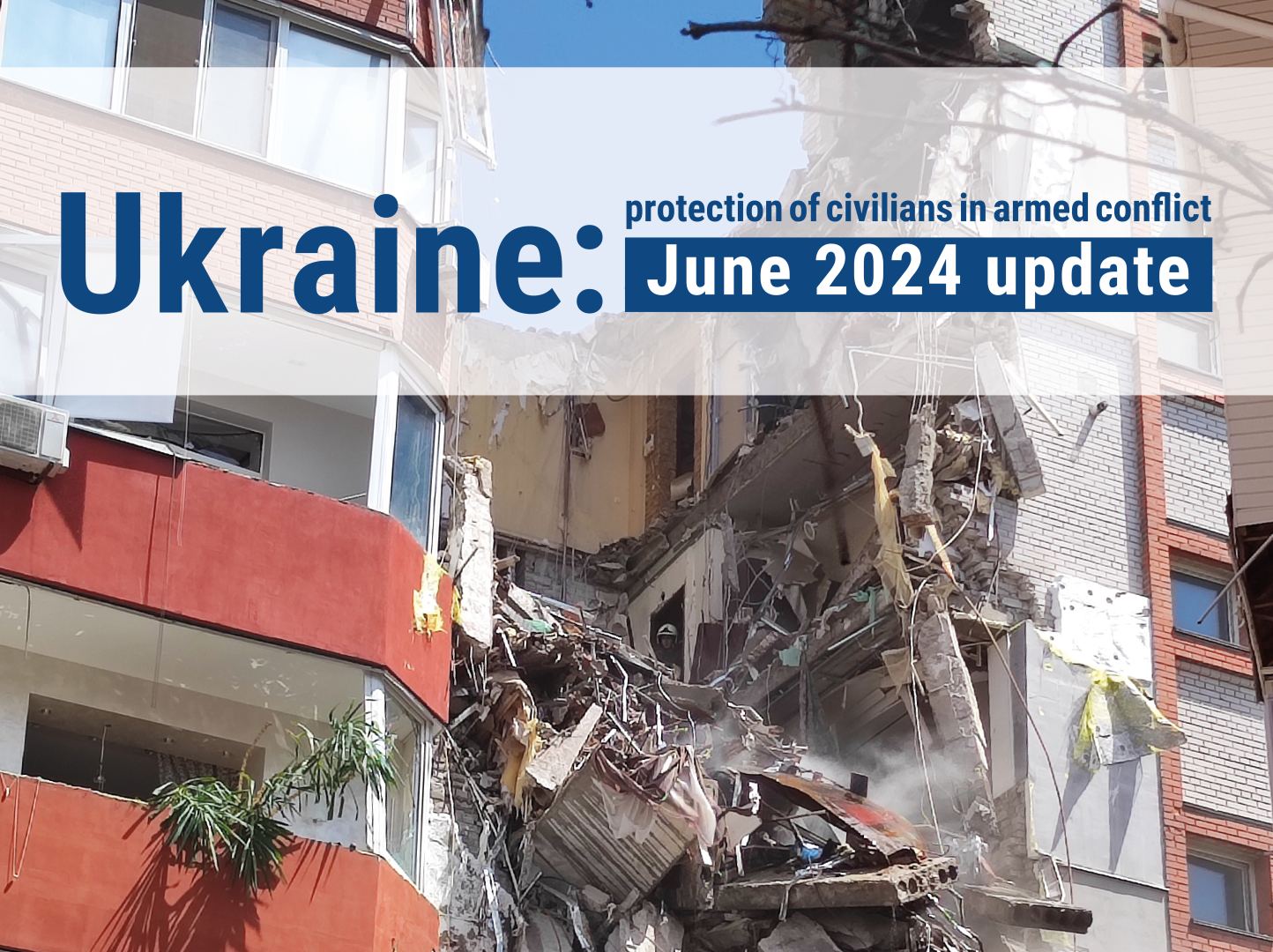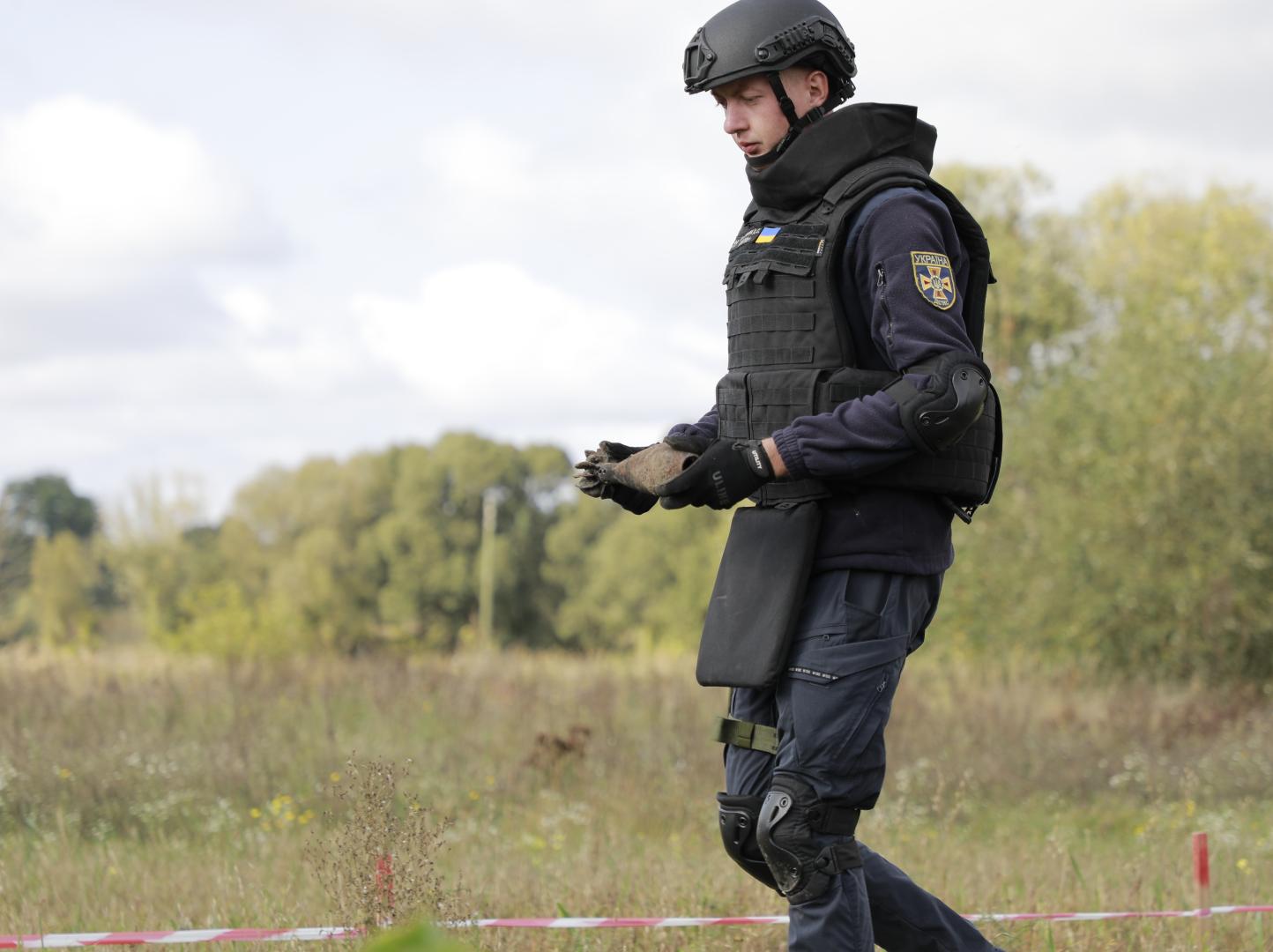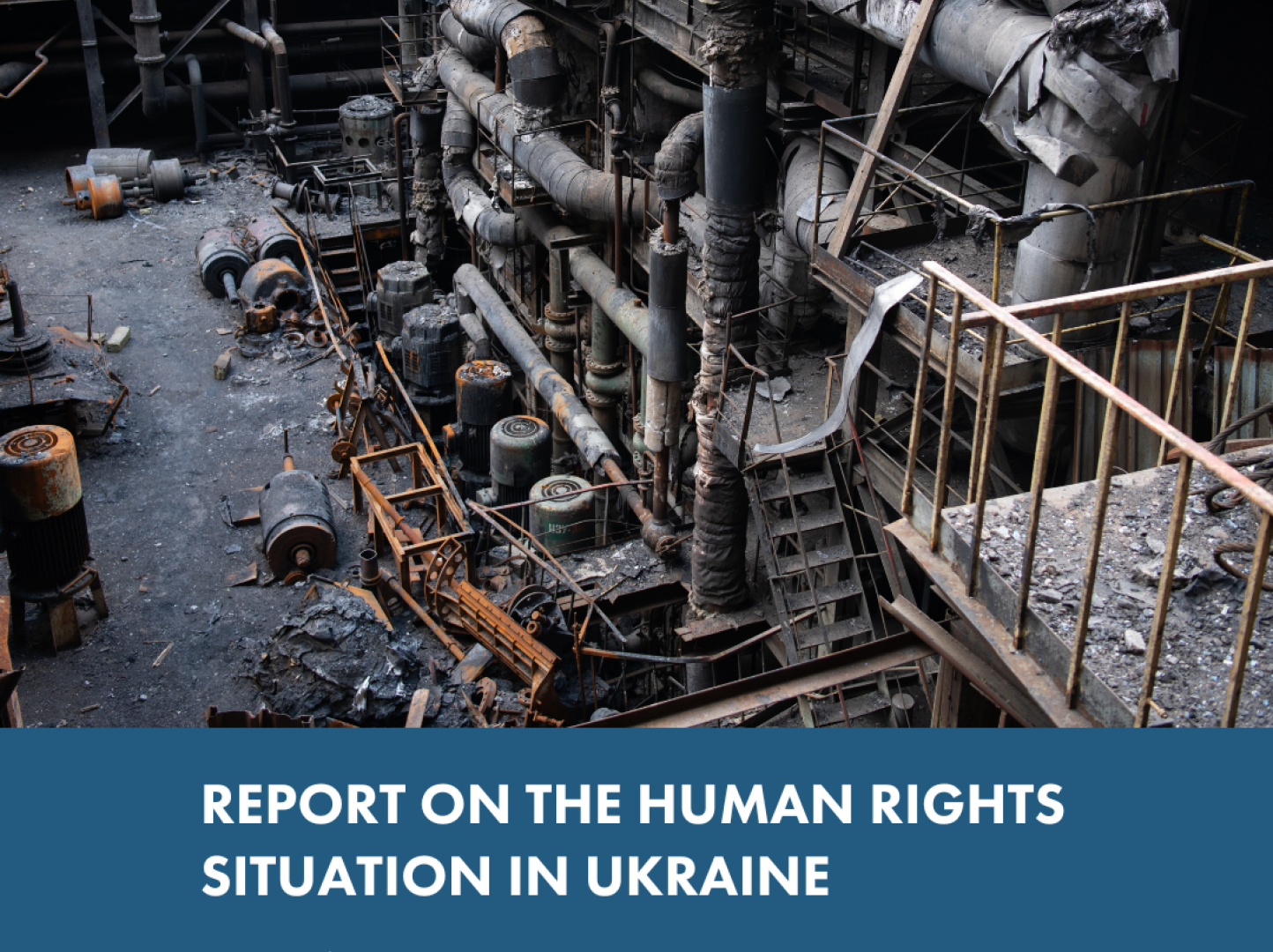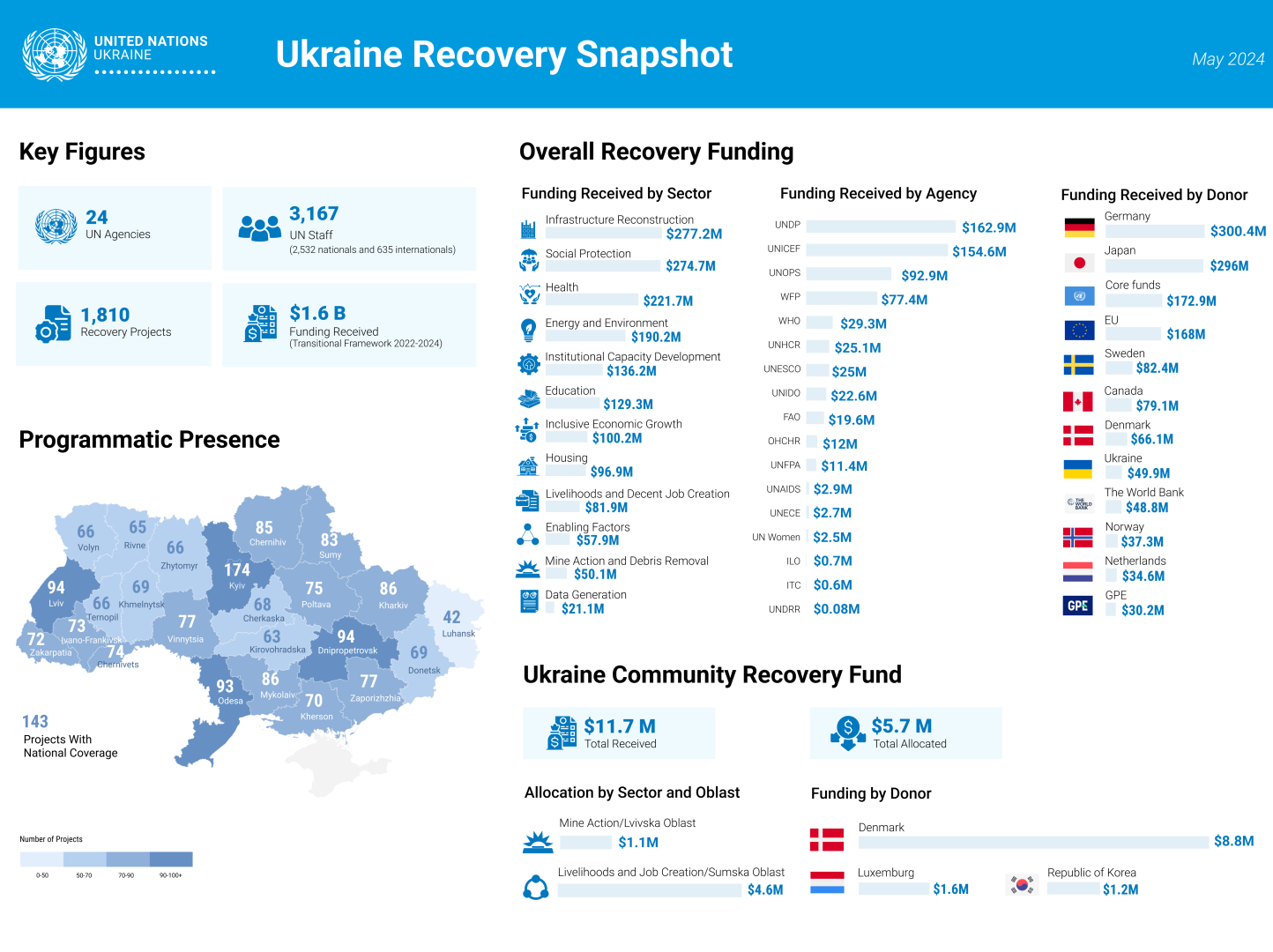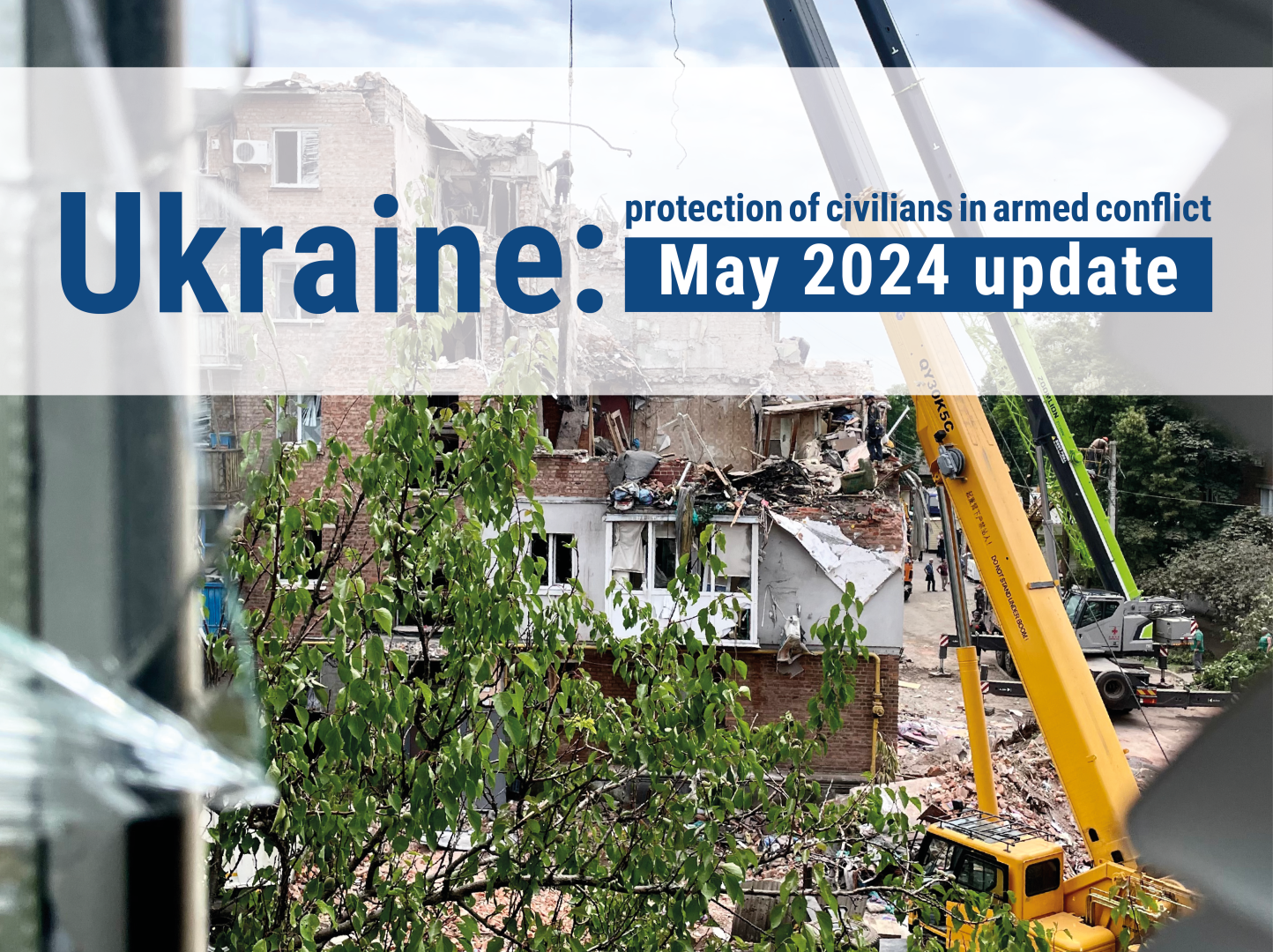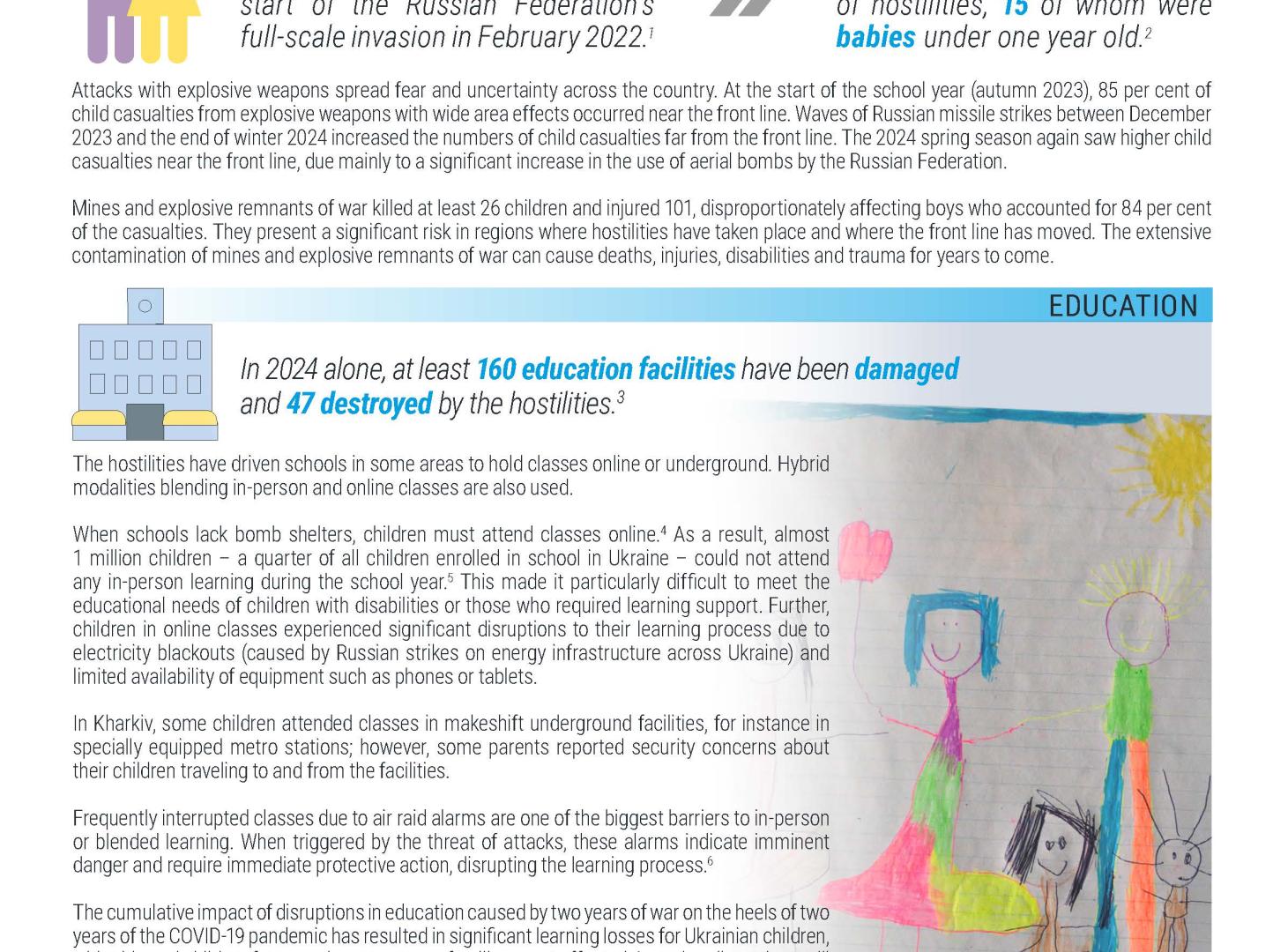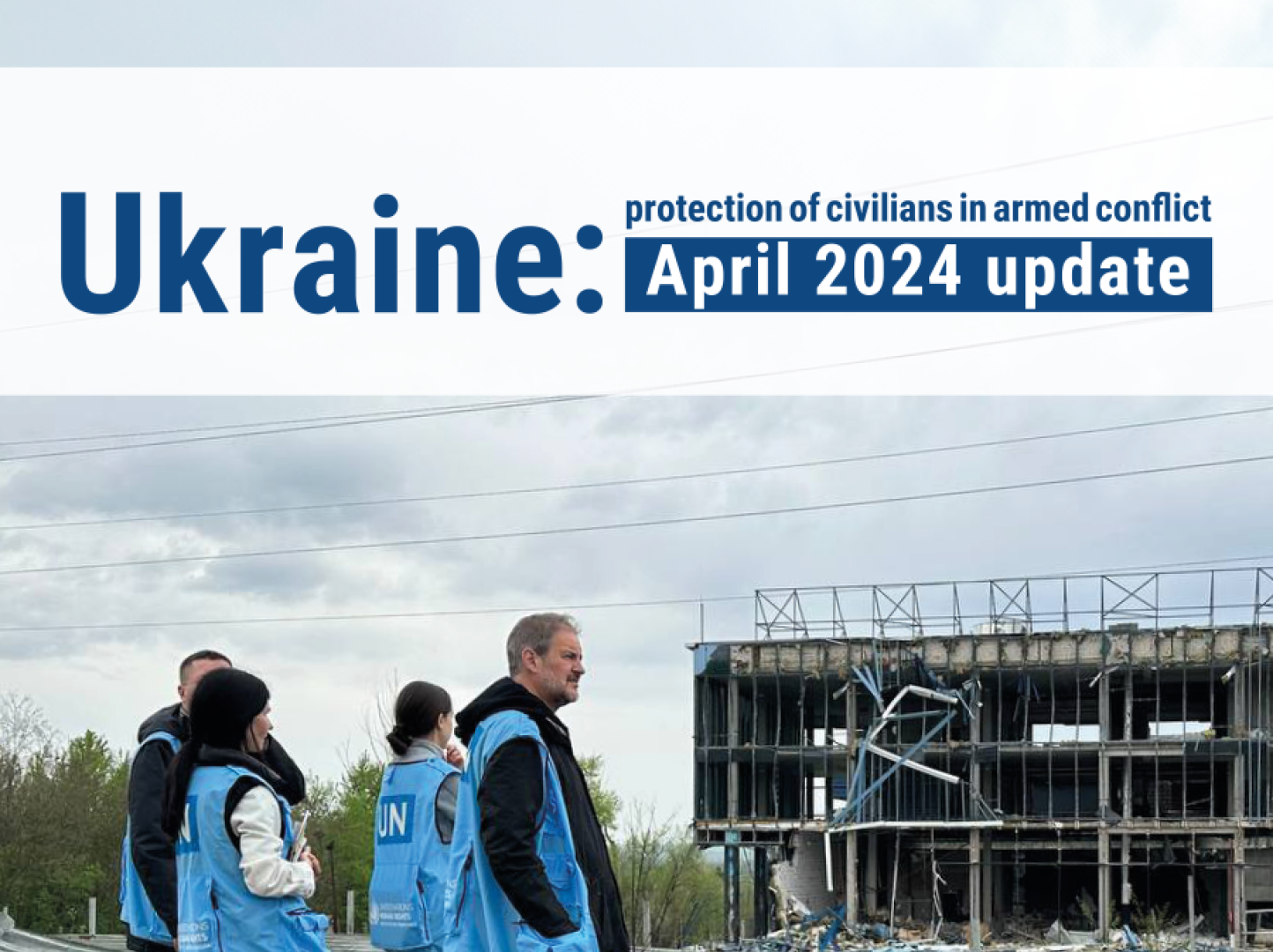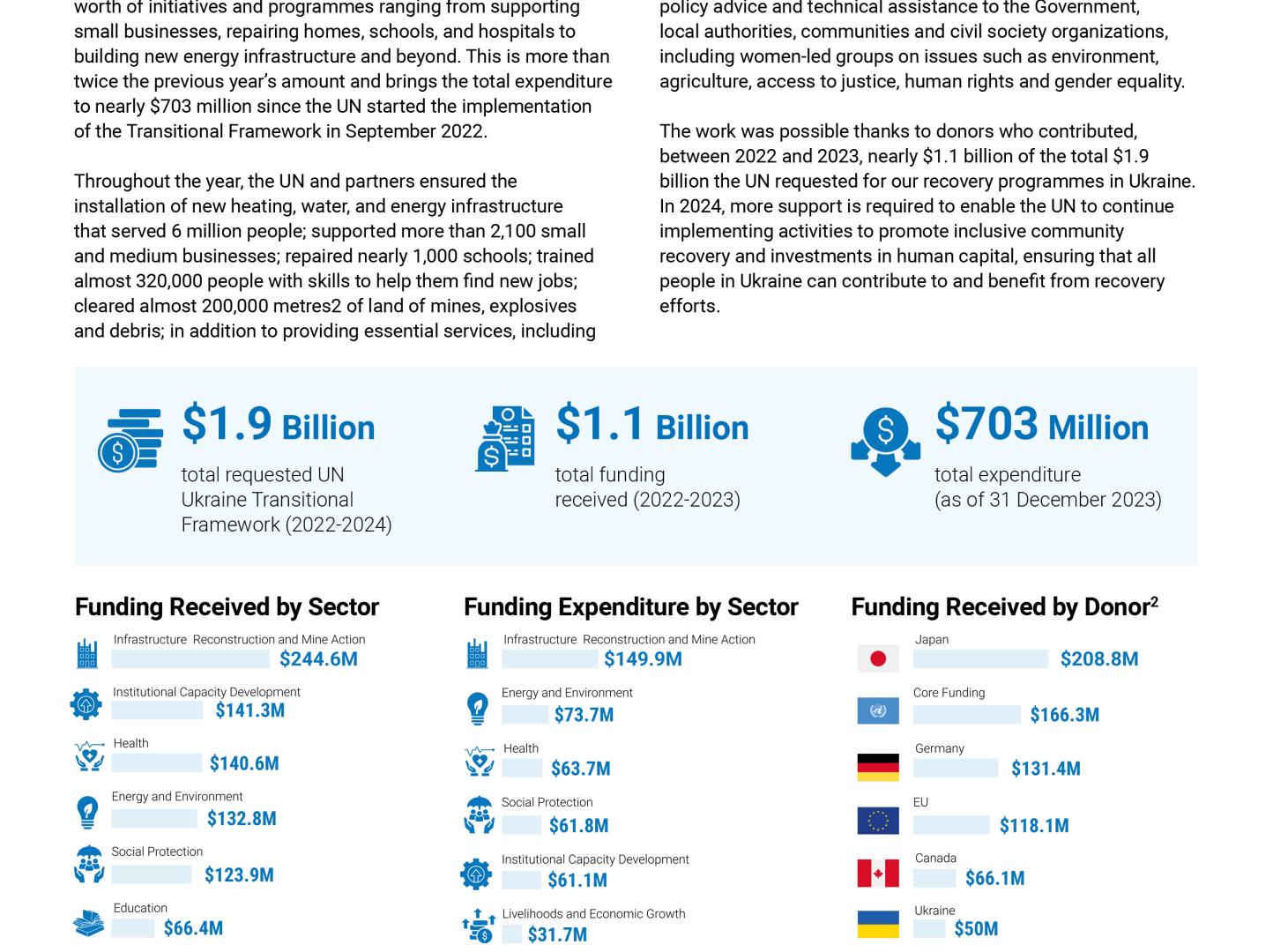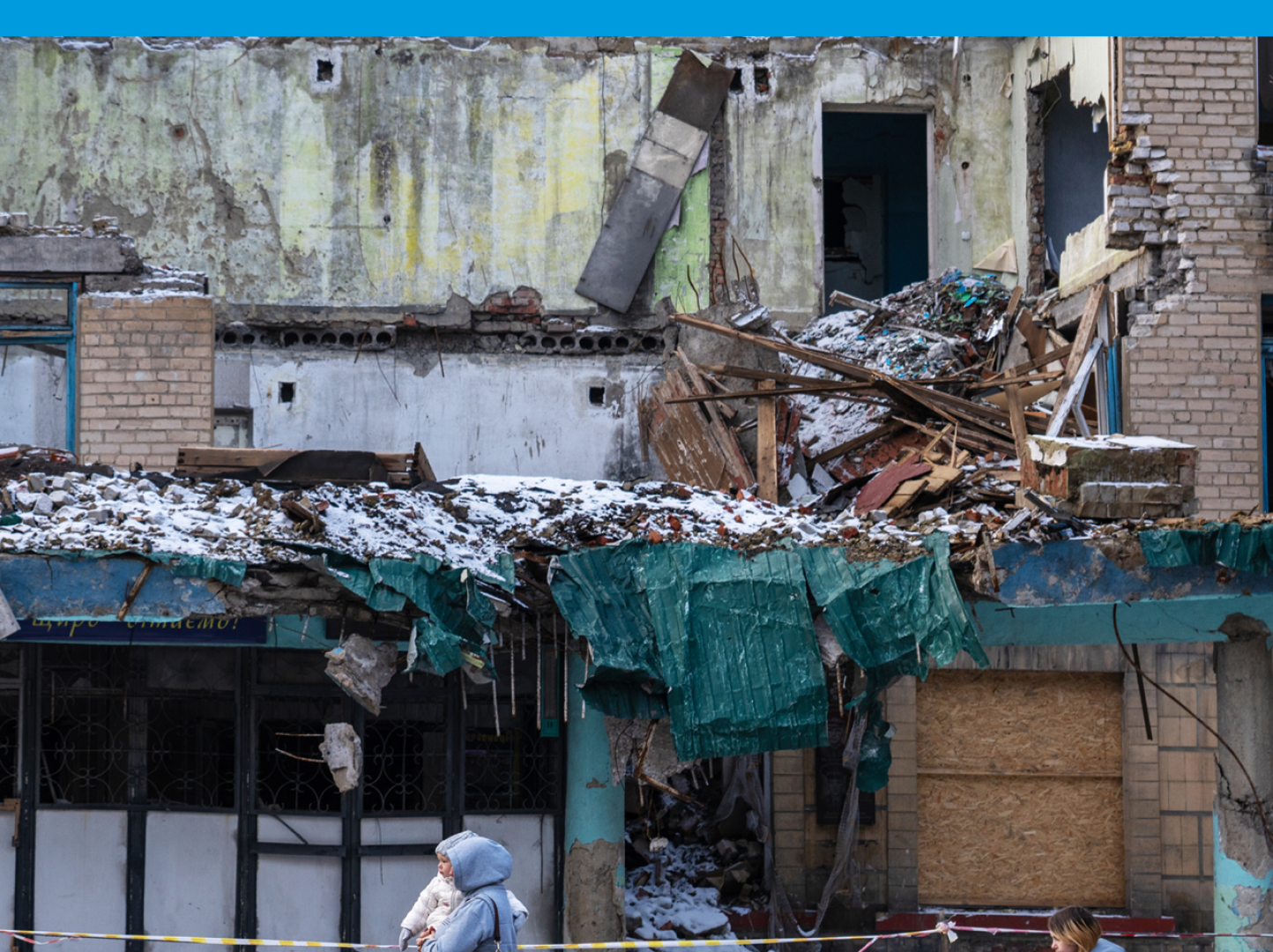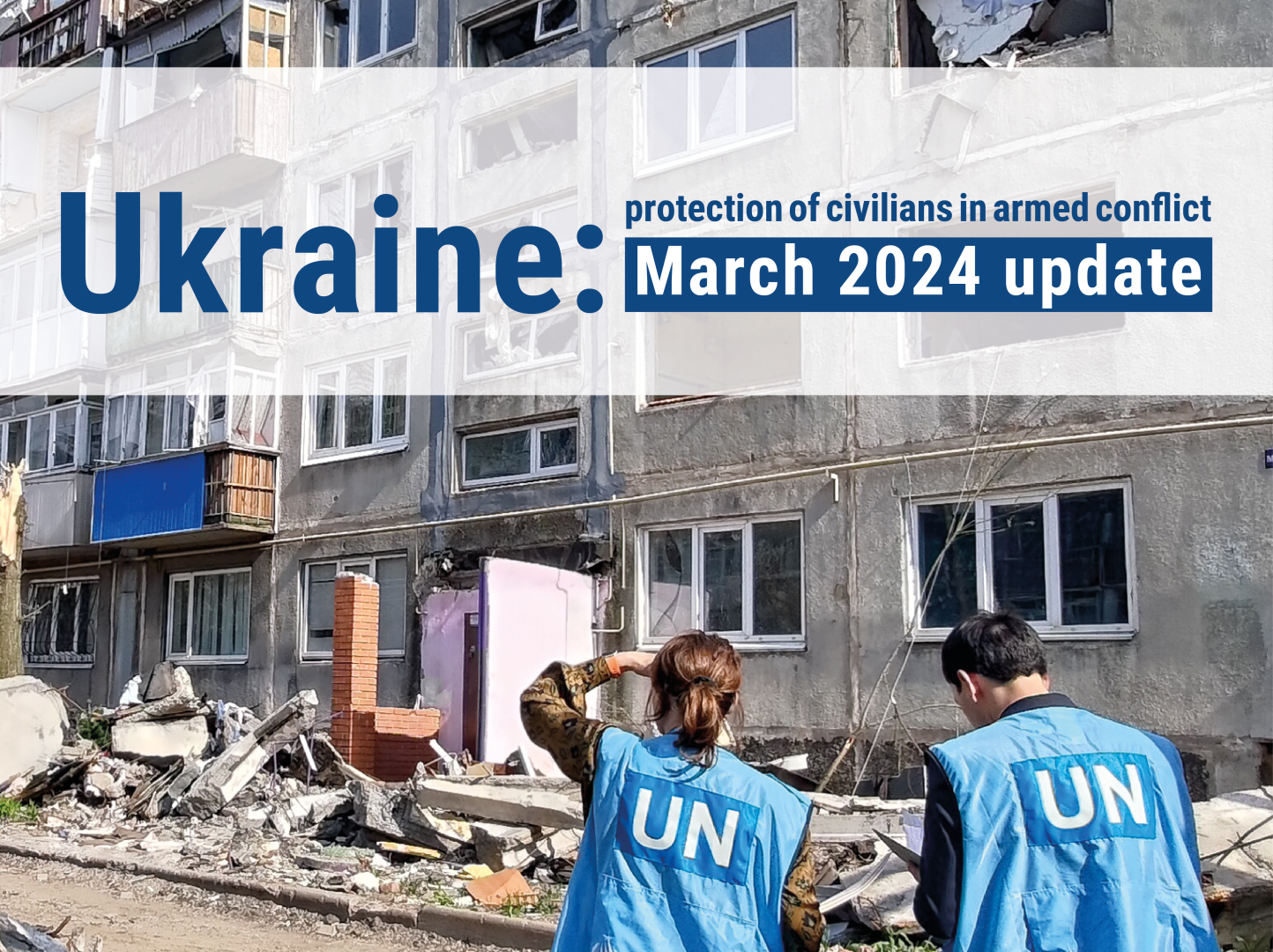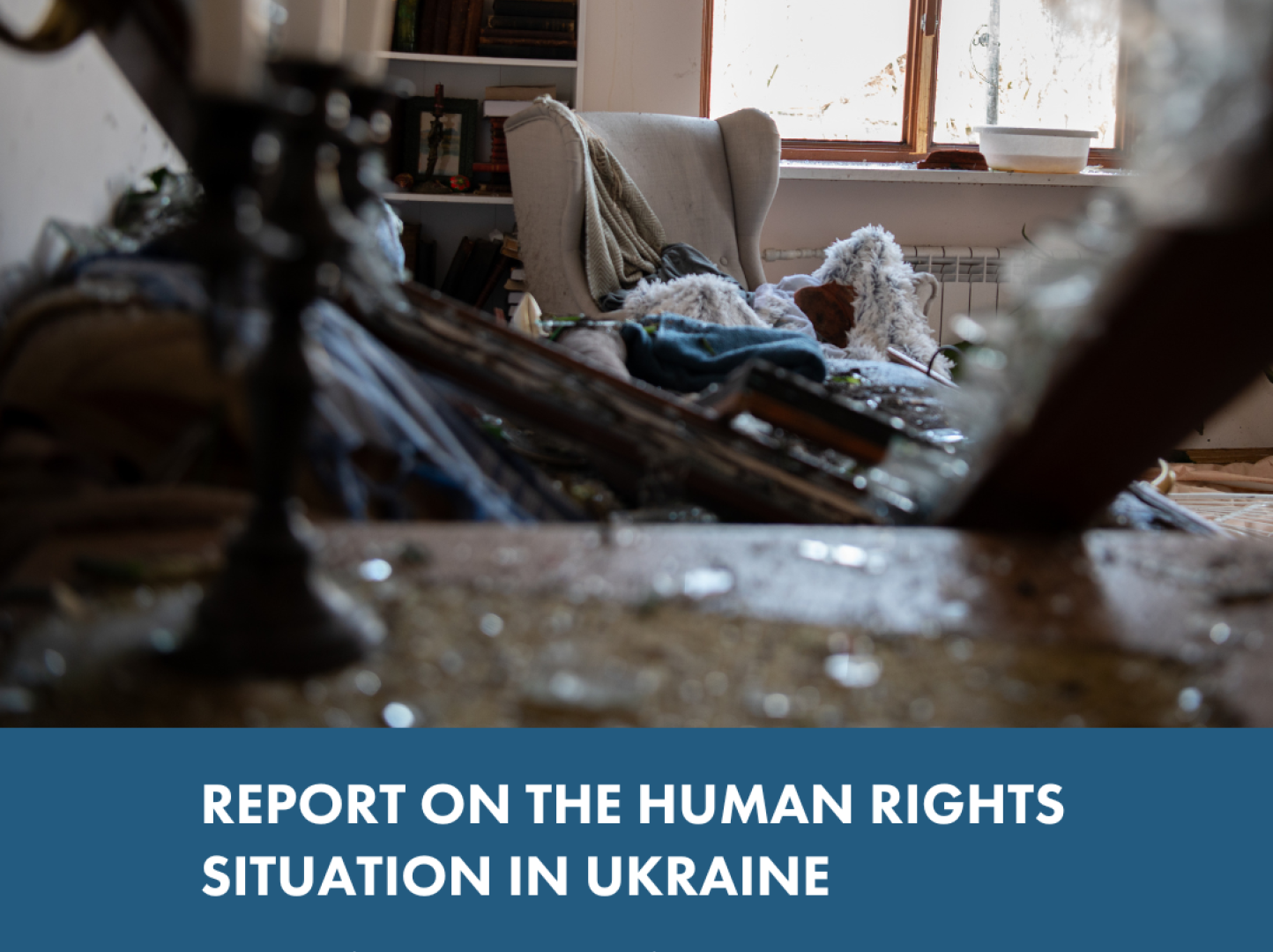Latest
Press Release
25 July 2024
OLENIVKA: TWO YEARS SINCE THE DEADLY STRIKE THAT KILLED DOZENS OF UKRAINIAN POWS, A CONTINUED CALL FOR ACCOUNTABILITY
Learn more
Press Release
25 July 2024
FINLAND CONTRIBUTES €2 MILLION TO THE UN WORLD FOOD PROGRAMME TO SUPPORT UKRAINIAN PENSIONERS
Learn more
Press Release
17 July 2024
UN Ukraine chief, Denise Brown, met representatives of the LGBTQI+ community in Kyiv
Learn more
Latest
The Sustainable Development Goals in Ukraine
The Sustainable Development Goals (SDGs) are a global call to action to end poverty, protect the earth’s environment and climate, and ensure that people everywhere can enjoy peace and prosperity. These are the goals the UN is working on in Ukraine:
Publication
15 April 2024
Annual Recovery Results Report 2023 - United Nations in Ukraine
- Foreword by the Resident Coordinator - In the third year of the full-scale Russia’s invasion, the
scourge of war is still bringing untold suffering and sorrow
to the people of Ukraine. The invasion, launched in violation
of the UN Charter and international law, has left thousands
of civilians killed and injured, caused massive destruction of
infrastructure, including hundreds of thousands of homes,
hospitals and schools, and deeply traumatized people regardless
of proximity to the front line. The war has shattered
the Ukrainian economy; rolling back development gains
made over the past years and plunging nearly 25 per cent
of people into poverty.The people of Ukraine are taking upon themselves the
monumental task to recover from the devastation caused
by the invasion. With remarkable and inspiring determination,
and no matter if they are close to the front line or in
communities where they have found safety and security,
Ukrainians are supporting one another to ensure their
communities are functioning, small shops are running,
schools are repaired and rebuilt with shelters so children
can attend in-person, hospitals and clinics reconstructed,
roads and bridges repaired and agricultural land and critical
and social infrastructure demined.The UN, the humanitarian community and our development
partners continue to work non-stop to ensure people enduring
the horrors of the war receive the support they need to
address their most immediate needs and also create the
conditions for their recovery. In 2023, more than 11 million
people received life-saving humanitarian assistance. This
achievement was made possible thanks to the efforts
of over 500 organizations – nearly 70 per cent of them
Ukrainian NGOs - our close collaboration with the authorities,
and the timely support of our donors.We have also scaled up our efforts to support recovery, with
more and more activities that provide people with durable
solutions and ensure they can get back on their feet. The UN
made significant contributions to Ukraine’s journey towards
a prosperous future: supporting strong data collection and
analysis to inform recovery priorities – including the third
Rapid Damage and Needs Assessment (RDNA) and the
Post-Disaster Needs Assessment (PDNA) of the Kakhovka
Dam’s destruction; creating platforms to engage communities
in the decision-making and forums to bring together
Government, donors and civil society; supporting small
businesses; repairing vital infrastructure; and contributing
to demining efforts and beyond.The UN –our 3,000 employees and 24 agencies – is determined
to continue supporting the Government’s recovery
priorities with investments in Ukraine’s communities, human
capital and national systems, and ensure recovery takes
into consideration the specific needs of women, people
with disabilities and marginalized groups.
Despite the progress, these efforts are not enough to stop
the suffering and devastating consequences of Russia’s
invasion of Ukraine. The world – and the international
community – cannot accept war as the new reality. Living
under constant bombardment, constant fear, is not normal.
For this reason, war as a state of existence for people in
Ukraine, must not be normalized. Every effort must continue
towards a just peace in line with the UN Charter.
Denise Brown
Resident Coordinator
United Nations in Ukraine
scourge of war is still bringing untold suffering and sorrow
to the people of Ukraine. The invasion, launched in violation
of the UN Charter and international law, has left thousands
of civilians killed and injured, caused massive destruction of
infrastructure, including hundreds of thousands of homes,
hospitals and schools, and deeply traumatized people regardless
of proximity to the front line. The war has shattered
the Ukrainian economy; rolling back development gains
made over the past years and plunging nearly 25 per cent
of people into poverty.The people of Ukraine are taking upon themselves the
monumental task to recover from the devastation caused
by the invasion. With remarkable and inspiring determination,
and no matter if they are close to the front line or in
communities where they have found safety and security,
Ukrainians are supporting one another to ensure their
communities are functioning, small shops are running,
schools are repaired and rebuilt with shelters so children
can attend in-person, hospitals and clinics reconstructed,
roads and bridges repaired and agricultural land and critical
and social infrastructure demined.The UN, the humanitarian community and our development
partners continue to work non-stop to ensure people enduring
the horrors of the war receive the support they need to
address their most immediate needs and also create the
conditions for their recovery. In 2023, more than 11 million
people received life-saving humanitarian assistance. This
achievement was made possible thanks to the efforts
of over 500 organizations – nearly 70 per cent of them
Ukrainian NGOs - our close collaboration with the authorities,
and the timely support of our donors.We have also scaled up our efforts to support recovery, with
more and more activities that provide people with durable
solutions and ensure they can get back on their feet. The UN
made significant contributions to Ukraine’s journey towards
a prosperous future: supporting strong data collection and
analysis to inform recovery priorities – including the third
Rapid Damage and Needs Assessment (RDNA) and the
Post-Disaster Needs Assessment (PDNA) of the Kakhovka
Dam’s destruction; creating platforms to engage communities
in the decision-making and forums to bring together
Government, donors and civil society; supporting small
businesses; repairing vital infrastructure; and contributing
to demining efforts and beyond.The UN –our 3,000 employees and 24 agencies – is determined
to continue supporting the Government’s recovery
priorities with investments in Ukraine’s communities, human
capital and national systems, and ensure recovery takes
into consideration the specific needs of women, people
with disabilities and marginalized groups.
Despite the progress, these efforts are not enough to stop
the suffering and devastating consequences of Russia’s
invasion of Ukraine. The world – and the international
community – cannot accept war as the new reality. Living
under constant bombardment, constant fear, is not normal.
For this reason, war as a state of existence for people in
Ukraine, must not be normalized. Every effort must continue
towards a just peace in line with the UN Charter.
Denise Brown
Resident Coordinator
United Nations in Ukraine
1 of 5
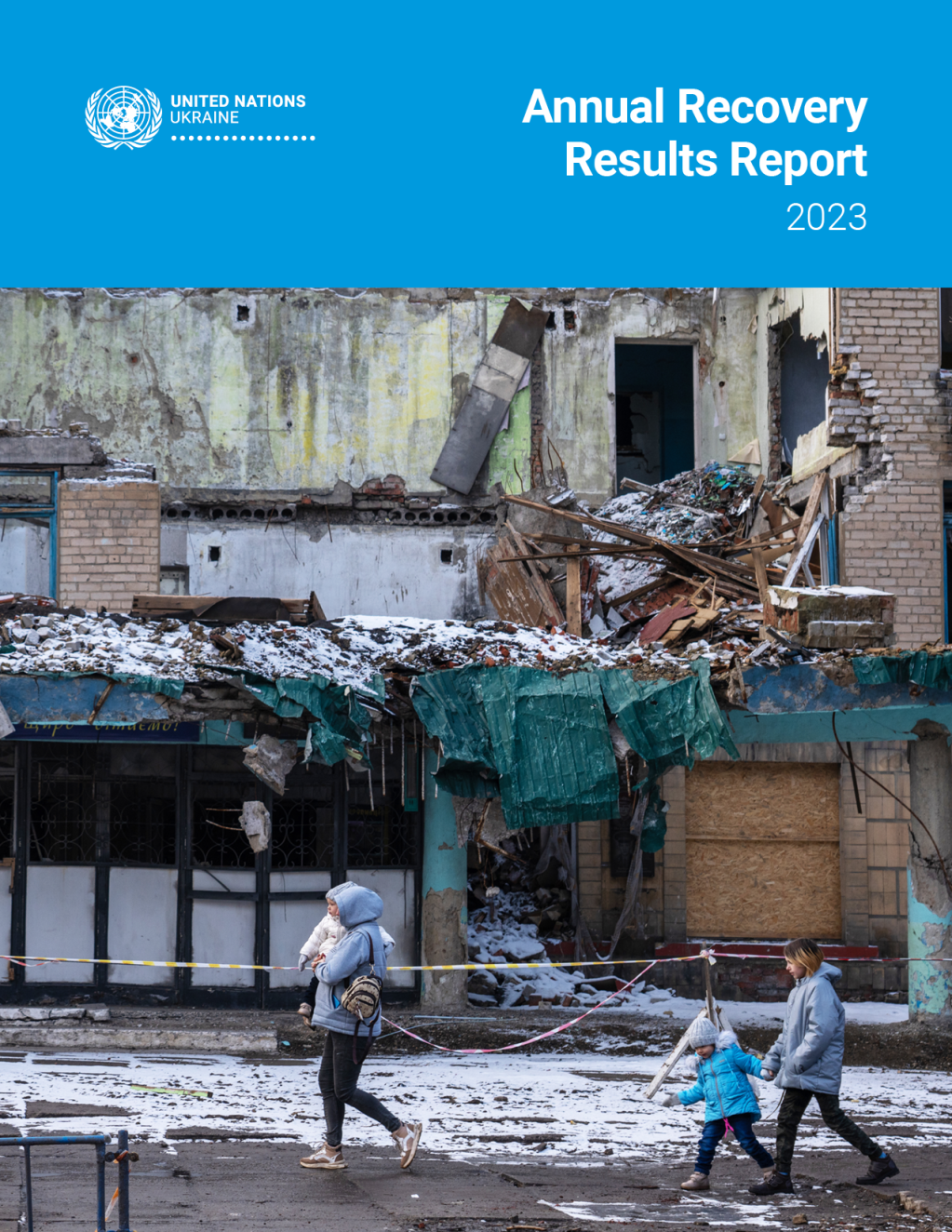
Press Release
03 July 2024
UN General Assembly President, Mr. Dennis Francis, Completes Official Visit to Ukraine
While in Kyiv, the President of the General Assembly met with H.E. Mr. Volodymyr Zelenskyy, President of Ukraine, and H.E. Mr. Dmytro Kuleba, Minister of Foreign Affairs of Ukraine. He held separate bilateral engagements with the Chairman of the Verkhovna Rada of Ukraine, H.E. Mr. Ruslan Stefanchuk; the Prime Minister of Ukraine, H.E. Denys Shmyhal; and Ombudsperson of Ukraine, Mr. Dmytro Lubinets.Throughout his discussions the PGA stressed that the Russian aggression against Ukraine is a violation of the UN Charter and reiterated the UN General Assembly’s commitment to the sovereignty, independence, unity and territorial integrity of Ukraine within its internationally recognized borders. The PGA commended efforts to advance peace in Ukraine in line with the UN Charter, international law and General Assembly resolutions. He expressed hope that the outcomes of the recent Summit on Peace in Ukraine would bring further progress in the near future.While in Kyiv, the PGA visited the formerly occupied territories of Borodyanka and Bucha, where he engaged with residents and learned first-hand about the destruction of schools, homes and critical infrastructure. While in Bucha, he visited the Church of Saint Andrew and participated in a candle-lighting ceremony, paying tribute to those who lost their lives. The UN has worked closely with the Government, local authorities and international partners to rebuild from the destruction.“I would like to think the darkest of the night is behind Ukraine, not ahead of it […] Your remarkable success thus far has inspired not just the General Assembly, but people around the world,” he said. In addition, the PGA participated in a lecture at Mariupol State University, currently based in Kyiv, where he engaged with students from three temporarily occupied regions studying law, political science, business and sociology. He also held a roundtable discussion with the UN Resident & Humanitarian Coordinator in Ukraine, Ms. Denise Brown, and the UN Country Team representatives.Throughout his engagements, President Francis underscored the need for the international community to continue providing much-needed support to Ukraine, particularly to protect civilians and critical infrastructure. The PGA used the opportunity to better understand the situation on the ground, as well as the urgent needs of civilians and humanitarian support groups. The PGA’s delegation included his Chef de Cabinet, a Senior Adviser on Peace and Security, and a Communications Adviser.Travel costs for the visit were covered by the Regular Budget and the OPGA Trust Fund. * *** *For media inquiries and further information, please contact:Katherine Stephan, Communications Adviser, travelling with the delegation: + 1 917 242-6186Carolina Nazzaro, Media Relations Adviser: carolina.nazzaro@un.org; + 1 917 892-2751 * *** *PGA’s Website: https://www.un.org/pga/78/YouTube: www.youtube.com/@unpga78X (Twitter): www.twitter.com/UN_PGAInstagram: www.instagram.com/unpgaLinkedIn: https://www.linkedin.com/in/un-pga78/
1 of 5
Speech
15 February 2024
Remarks by the Head of the UN in Ukraine, Denise Brown, during the launch of the third Rapid Damage and Needs Assessment
I stood here in exact same spot last year when we launched the RDNA2, with the same actors, the Prime Minister of Ukraine, the European Union and the World Bank.
I was thinking this morning about what I said then, and I made the point that no one wants to live in a collective centre. People want to return home, be in their communities, send their kids to school, have easy access to health care, and walk down the street to the market. And mainly live without the fear and trauma that war creates.
What I said one year ago is still true and we see it every day: Ukrainians are determined to return to their lives pre-war with their eyes on the future.
That is a big challenge for the 4.5 million internally displaced persons in Ukraine and the 5.9 million people who fled across borders to seek safety and refuge in Europe.
Missile strikes in communities along the front line and beyond, as we saw this morning, including here in Kyiv, almost every day, make that recovery a challenge. The reality is, and I see it all the time, that displacement and collective centres remain an unfortunate reality for millions of Ukrainians. Hospitals, schools, and ports continue to be attacked, damaged and destroyed.
And, I think most horrifically, civilians killed, injured and maimed, including children, which is what we saw yesterday again in the Donetsk Region.
I know the RDNA3 reports it – the UN contributed, there is a great partnership with the Government, the European Union and the World Bank – and I also have what I know from my missions throughout the country that, for the moment – and it is in the report but hasn’t been mentioned yet – humanitarian assistance and recovery are going to have to co-exist for quite some time. And our challenge is linking one to the other.
Humanitarian assistance remains a lifeline for millions of Ukrainians who, because of the war, as I said many times already, can't yet go home or those who remain in their homes along the front-line communities because their life has no meaning anywhere else. And despite their daily struggles, what I heard so many times from those people is that their life has purpose and their life has dignity, no matter how difficult it is.
I really want to emphasize that the Government, the United Nations, the international and national NGOs, local volunteers, the regional and local authorities, we have created a vast network that allow us to respond when a missile strikes a community, for the displaced to provide them with daily support, for the disabled… And in the report you will heart that the number of disabled in the country has grown over 7 per cent since we launched the RDNA 2. And the support for the elderly. So that network provides this assistance.
In Bilozerka, where I was about 10 days ago, and in Kherson, where I was this past Monday, people continue to depend on that assistance. So, the reality is that, again, humanitarian assistance and recovery have to co-exist.
And I really want to thank the donors because your support allowed us collectively to provide 11 million people with assistance in 2023.
But what is that vital step beyond humanitarian assistance, where possible?
For the UN, and in the report this year, you will really see the focus is community recovery.
In Izium, in Mykolaiv, in Sumy, and outside of Kyiv in Ivankiv, the people and the authorities are now well positioned, the conditions are in place to move beyond humanitarian assistance, and take back their lives.
Based on the leadership of local authorities, based on community-determined priorities, civil society engagement, the inclusion of women – not just inclusion of women but inclusion as decision-makers –, the disabled – again whose numbers have grown – and minority communities such as the Roma – I was in Uzhhorod last week and spent some time with them – so when the conditions are there, including security, recovery is taking place.
Social services have been re-established; schools built with bunkers – we heard that 90 per cent of children are registered, not necessarily attending but registered for schools –; hospitals and clinics reconstructed; roads and bridges repaired; agricultural land and critical social infrastructure demined; and small businesses reopened, and many of those small ones are women-owned.
This will have to happen community by community. And the numbers in the report, as you will hear and see when we have the presentation, those are very big numbers, a little bit overwhelming.
But the restoring back is really going to take place in the communities.
I was thinking about Mykolaiv. When I first was there in September 2022, there was no electricity, the water tasted like salt, and most of the people had left. I was there this past weekend, and it is a city that can be lived in now and people have returned.
The RDNA 3 is the documentation of the damage and needs that drives national prioritization and the financial mechanisms. But this year, in that report, we are also focusing on recovery and the human capital.
Behind the numbers is the critical need to ensure that Ukraine has the people with the right skills and capacity to take back their lives, and recover – across the country, not just in part of the country – what was lost.
I just want to finish by saying that the war is fought by the people of Ukraine.
The impact of the war is felt every single day by the people of Ukraine.
And the recovery of the country will depend on the people of Ukraine, with our support. And while we are not pleased that we have to have another RDNA, as Gevorg said, at least we have a document that will drive the priorities, determine the financial requirements, and allow us, all the partners, to align behind the common objectives.
Thank you very much.
***
For more information, refer to the Press Release.
***
For more information, refer to the Press Release.
1 of 5
Press Release
28 February 2024
Russian Federation’s decade-long occupation of Crimea marked by widespread violations
In a report issued today, HRMMU said the Russian Federation has unlawfully imposed its citizenship, laws, and institutions on Crimea’s population across all spheres of life, suppressing opposition and dissent. The report cites examples of steps taken by the Russian Federation to restrict the civic space and limit fundamental freedoms. Crimean Tatar leaders, perceived as opposing the occupation of Crimea or the Russian Federation policies, were among those particularly affected by the measures. While Crimean Tatars, who fled the peninsula in the wake of the illegal annexation, have been barred from returning to their homeland, many Russians have been resettled in Crimea, in an apparent attempt to change the peninsula’s demographic structure. Large-scale expropriations of public and private property have been implemented without compensation or regard for international law.“Over the past decade, we have documented efforts by the Russian Federation to impose the Russian language, culture, and institutional framework on Crimea while at the same time taking actions to erase the peninsula’s rich cultural, linguistic, and religious heritage,” said the head of HRMMU, Danielle Bell.The report says opposition to the efforts by the Russian Federation to consolidate its hold on Crimea has been met with harsh reprisals. Individuals who opposed or challenged the occupation were subjected to human rights violations, including enforced disappearance, arbitrary detention, torture and ill-treatment. HRMMU says it documented 104 cases of enforced disappearance and 55 cases of torture affecting pro-Ukrainian activists, journalists and Crimean Tatars.The occupying authorities in Crimea have suppressed freedom of expression, including the expressions of minority cultures and identities, and severely curtailed the freedom of religion of minority groups, particularly those opposing official narratives, the report said.“Our findings on the human rights situation in Crimea, which has endured Russian occupation for more than a decade now, are not only alarming but they are also a grim harbinger of the devastating and lasting impact Russian occupation may have on other occupied regions of Ukraine,” said Bell.
1 of 5
Story
19 February 2024
Aid workers go the extra mile for Oleksandr
"I desperately needed simple things – to do shopping, to cook food, to maintain hygiene. I also needed surgery that couldn't be performed in our town." In October 2023, Oleksandr suffered an injury unrelated to the war that rendered him almost immobile and in need of urgent hip replacement surgery. However, the ongoing war in Ukraine, particularly fierce in the south and east, had disrupted local service providers, including health facilities and public transport. Residents with a disability, trauma or illness were in a dire situation, unable to access essential services.
"The relentless hostilities in areas close to the front lines, particularly in the east and the south of the country, have severely affected civilian infrastructure and disrupted public transportation," says Yevhen Kaplin, Head of Humanitarian Mission Proliska. “Social transport is a lifeline.”
Humanitarian Mission Proliska is just one of the many humanitarian organizations that stepped in after recognizing the urgent need for assistance in regions devastated by the war. It offers social transportation services – a lifeline for people stranded in front-line towns.
"I was referred to the humanitarian organization [Humanitarian Mission Proliska],” Oleksandr explains, a glimmer of hope in his voice.
This referral marked a turning point in his quest for aid. Within a few days, he was on his way to Uzhhorod, located 1,200 km to the west of Ukraine, to receive proper medical care and support.
Proliska has offered social transport services since 2022, with support from the OCHA-managed Humanitarian Fund for Ukraine. It helped Oleksandr in every way possible.
For example, when he needed blood during surgery, the organization’s staff donated their blood without hesitation. "The blood was urgently needed for an older person, so I made the decision to contribute. If one can easily help, why not?” explains Proliska staff member Artem Bakalo. “Moreover, I have experience as a blood donor and frequently donate, especially given the ongoing war and the high demand for surgeries." Since Russia’s full-scale invasion in February 2022, protection partners have provided evacuation and social transportation support to about 1.2 million people. In 2023, they assisted more than 170,000 people – 60 per cent of whom were older people and people with disabilities.
For example, when he needed blood during surgery, the organization’s staff donated their blood without hesitation. "The blood was urgently needed for an older person, so I made the decision to contribute. If one can easily help, why not?” explains Proliska staff member Artem Bakalo. “Moreover, I have experience as a blood donor and frequently donate, especially given the ongoing war and the high demand for surgeries." Since Russia’s full-scale invasion in February 2022, protection partners have provided evacuation and social transportation support to about 1.2 million people. In 2023, they assisted more than 170,000 people – 60 per cent of whom were older people and people with disabilities.
1 of 5
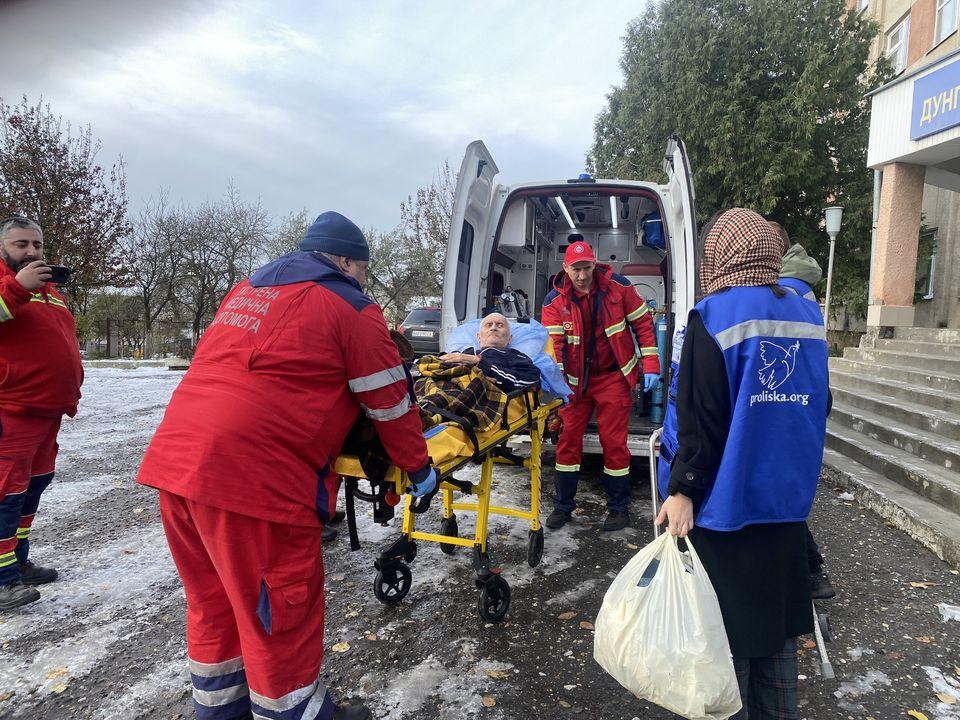
Story
05 July 2024
Ukraine's Kharkiv transit centre: Finding comfort after fleeing home
By Viktoriia Andriievska and Tanya Lyubimova Evacuees and aid workers at the centre share their stories. Valentyna: Leaving everything behindValentyna, 65, arrived at the transit centre from Okhrymivka village, located just 4 km from the border. She and her daughter fled in a car arranged by a family friend. "Those were terrible days when we had to hide in the basement of our house because of the constant bombardments," she recalled. "We left in a rush with only a small bag of things. Now we have to get everything, from toothbrushes to clothes." Fighting back tears, Valentyna spoke about what they had to leave behind. "We had a house and a well-maintained garden where we grew our own vegetables. That helped us to get by. Leaving this all behind, knowing my friends and extended family are still there, is truly the hardest thing," she said. Their friend found them a modest apartment in Kharkiv City. At the transit centre, Valentyna registered for cash assistance and received aid, including bedding and basic household items. Humanitarian response in Kharkiv City Since 10 May, nearly 50 humanitarian organizations have collaborated to support evacuations and provide assistance at the transit centre and temporary accommodation sites. After months of hostilities, many people, particularly older people and those with disabilities, have depleted almost all their resources. “People were evacuated, with the support of aid organizations, and some arrived using their own means,” explained Iryna, an aid worker from the Relief Coordination Centre. She joined the team last year after her husband, a volunteer in the Kharkiv Region, was killed during evacuations in the Kupiansk district. “At the transit centre, people receive food, water, clothes, mattresses, bedding, household items, hygiene and other things they need,” she added. Humanitarian partners also provide access to psychosocial support and legal assistance, including housing, land and property as compensation for damaged and destroyed property. Organizations conduct on-site referrals and case management when needed. Yaroslav, from the non-governmental organization (NGO) FHI360, said: “Many people who come here are older people. Some people have been displaced more than once. They are under a lot of stress; some are severely traumatized or have panic attacks.” Psychologists are available at the centre from morning until night to provide support. Humanitarian partners also help out at Kharkiv’s railway station, referring people who fled by their own means and may need support. Multipurpose cash assistance Cash is one of the most requested types of assistance at the transit centre.Anatolii, an aid worker from the NGO Right to Protection, explained: “In a humanitarian context like in Ukraine, cash is usually the preferred option because people fleeing homes have different needs. This cash means they can buy the things they most need. For some people it may be clothes or food; for others, medicines.” The nearly 5,000 people who registered for cash assistance between 10 and 30 May typically received the money within a week. The humanitarian multipurpose cash assistance programme in Ukraine is one of the world’s largest, involving almost 50 humanitarian organizations. Since February 2022, partners have provided multipurpose cash support to more than 10 million people. Feeling safe and protected in a temporary shelter “Most of the people who evacuated have found shelter in the homes of their relatives and friends,” said Iryna. “Those who had nowhere to go have been housed in collective centres set up in dormitories and other available premises fit to serve as temporary accommodation.” Since mid-May, nearly 1,000 people, including more than 70 children and 140 people with limited mobility, have been accommodated in 46 collective centres in and around Kharkiv City. At these centres, people receive food packages, hot meals, water, hygiene and household supplies, cash assistance, medical care and mental health support. Aid workers monitor the sites and arrange the necessary assistance. “All the hygiene supplies – everything we need – is in these boxes, clothes as well. Even some colourful hairpins!” said Tamara. She and her husband, Nikolay, secured a family room in a collective centre after their home in Slobozhanske was damaged by four attacks and left in ruins. Vita, a Ukrainian Red Cross volunteer from Vovchansk, noted: “The needs are growing as more and more people arrive.” She fled with her family in the first days of the evacuations and now dedicates all her time to supporting others. “I will continue as long as it’s needed. These are my people and they need help.”
1 of 5
Story
04 July 2024
Explore the interactive dashboard on the UN's recovery programmes in Ukraine
Explore our UN Ukraine Recovery Dashboard!This interactive dashboard provides detailed insights into our recovery programmes and funding.
The UN provides crucial support to people, communities, and institutions to strengthen systems and foster resilience, essential for the country's recovery from the devastation caused by the war. This includes focusing on critical areas such as infrastructure reconstruction, mine action, housing, livelihoods, energy, health, education, social protection, environmental sustainability, and economic growth.
Transparency and accountability are fundamental to our approach. We are dedicated to making data accessible to all stakeholders through this interactive tool. [powerbi:https://data.uninfo.org/Home/_UkraineUNCT]
The UN provides crucial support to people, communities, and institutions to strengthen systems and foster resilience, essential for the country's recovery from the devastation caused by the war. This includes focusing on critical areas such as infrastructure reconstruction, mine action, housing, livelihoods, energy, health, education, social protection, environmental sustainability, and economic growth.
Transparency and accountability are fundamental to our approach. We are dedicated to making data accessible to all stakeholders through this interactive tool. [powerbi:https://data.uninfo.org/Home/_UkraineUNCT]
1 of 5
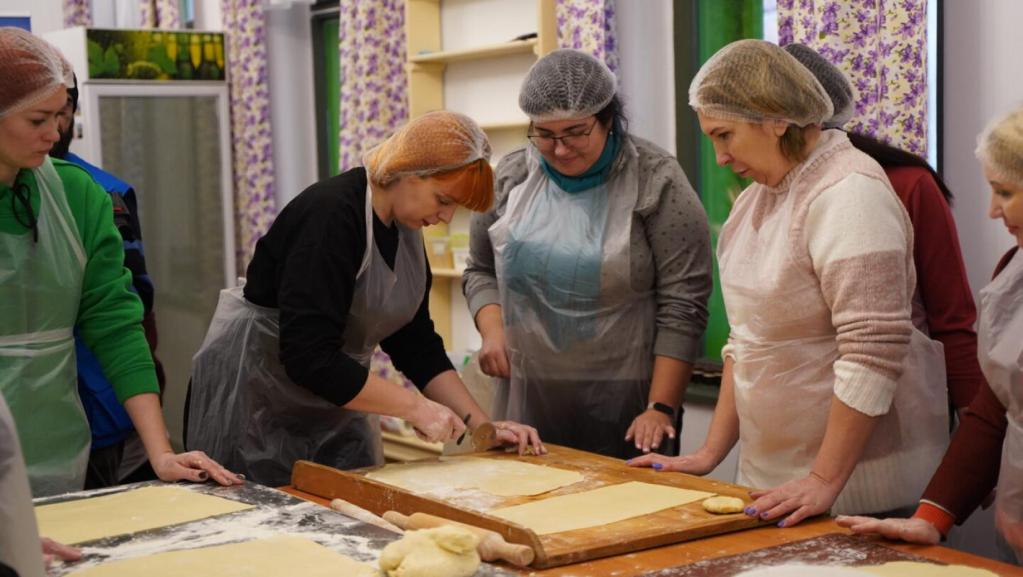
Story
06 June 2024
Kakhovka Dam destruction, one year on
One year ago today, the destruction of the Kakhovka Dam unleashed a devastating flooding that left over 620 square kilometres of the Ukrainian territory under water. This was possibly one of the most significant incidents of damage to civilian infrastructure since the start of the Russian invasion of Ukraine in February 2022. The destruction claimed lives, forced thousands to flee, left thousands more stranded and laid waste to Ukrainian land and livelihoods on both sides of the front line The Kakhovka reservoir, the primary source of drinking water for over 700,000 people in southern Ukraine, was depleted. The catastrophic environmental effects of the flooding will linger for years to come, affecting not only Ukraine.The UN responseThe UN response was swift and continues today. Regrettably, denials from the Russian Federation prevented the UN from reaching people in Russian-occupied areas.In areas under Ukrainian control, the response began on day one. The UN and its partners rushed to provide people with desperately-needed water, food, health care, cash and protection and transport services, reaching close to 200,000 people in just a few days. Despite tremendous challenges, in June 2023 alone, the UN delivered approximately 20 inter-agency convoys bringing almost 80 truckloads of vital items to thousands of people affected by the disaster, in addition to the regular assistance provided separately by UN agencies and NGOs. Some supplies were delivered by boats and amphibious trucks, ensuring aid would reach people stranded by the flooding. Water, food, health and cash assistance to people impacted by the disasterThe UN and humanitarian organizations delivered around 20 million litres of bottled and trucked potable water, supported nearly 70 local water enterprises to ensure supply, supporting the drilling of boreholes for water production, including by delivering pumps, tap stands, water treatment units and water storage provided. Cash assistance was provided to nearly 40,000 people, while over 200,000 rations of ready-to-eat food were distributed in the Kherson and Mykolaiv regions. Health assistance was also a priority, with mobile teams providing aid across the affected areas. The UN also supplied medical equipment, including emergency health kits, trauma kits, diagnostic tests, and treatments for acute watery diarrhoea, including cholera, sufficient to provide healthcare to nearly 38,000 people for three to six months.Nearly 65,000 emergency repair items and household supplies were distributed to people whose homes had been damaged in the Kherson region. From the earliest days of the disaster, Child Protection organizations reached over 14,000 people, including 7,300 children and over 6,600 caregivers, by deploying multidisciplinary mobile teams to the affected areas, providing mental health and psychosocial support, delivering essential supplies, and ensuring child protection case management and legal assistance.The response continues to ensure people can recover from this human-made catastropheThe UN response extends beyond the emergency phase and continues to support communities in southern Ukraine as they recover from yet another disaster caused by Russia’s invasion. This included supporting a Post Disaster Needs Assessment and an assessment on the environmental impact of the destruction to inform the ongoing response.In the following months, the UN and its partners repaired homes for hundreds of people and deployed nearly 200 health workers to southern Ukraine to ensure services would continue despite the destruction. Repairing and building alternative water sources became a priority, with mobile water treatment facilities deployed to the Kherson and Dnipro regions, water pumps sent to Nikopol, and efforts to increase the water supply from the Karachunivsky water complex, supporting 600,000 people in Krivy Rih City.
1 of 5
Story
30 May 2024
A multi-generational story of endurance
"Mom, there's been an attack. The building of our collective centre was hit," Nadiia heard the voice say at the other end of the phone. "But please don’t worry, we are safe."In early April, Nadiia, 65, a Dnipro city resident, was attending an evening church service for peace in Ukraine when she received a call from her daughter. She immediately hurried back to the temporary shelter, commonly referred to as a collective centre. It became home for Nadiia, her daughter and granddaughter a year ago, when they fled their hometown in the Luhansk Region. They braced for yet another ordeal. Making her way through the city, Nadiia’s main concern was her 11-year-old granddaughter, Alisa, born with a disability and immobile. "All our lives revolve around Alisa," Nadiia explained tearfully. "We tried to comfort her in every possible way. I cannot express how difficult it was to leave our home seeking safety, only to find that safety remains elusive even here, far from the front lines." When she arrived at the collective centre, Nadiia found her daughter and Alisa in distress following the attack and comforted them. Several weeks later, they regained their footing. She explained: "Our family received assistance from psychologists, which greatly aided our recovery from this latest trauma." Nadiia expressed gratitude for the support her family received from humanitarian organizations before the attack in April: "Thanks to the volunteers and aid workers, we were able to flee in the first place. And upon arriving in Dnipro, they helped us arrange a space for a displaced child, provided a wheelchair, household items and more. The local community was very kind, sharing food and clothes with us." Humanitarian organizations had already helped repair the building where displaced families found shelter. But they will now have to repair it again. Following the incident, psychologists from the NGO Right to Protection swiftly intervened to assist people affected at the collective centre. Witnessing the attack's profound toll on people such as Nadiia, the mental health and psychosocial support team offered counselling sessions to help them process their emotions and fears. Nadiia and her family, in particular, received counselling to help them develop effective coping mechanisms. Through these efforts, they regained a sense of stability and hope amid the fear and uncertainty caused by the war. "Despite all the difficulties, I believe that one day we will be able to return to our peaceful home where we can live without fear," Nadiia concluded.
1 of 5
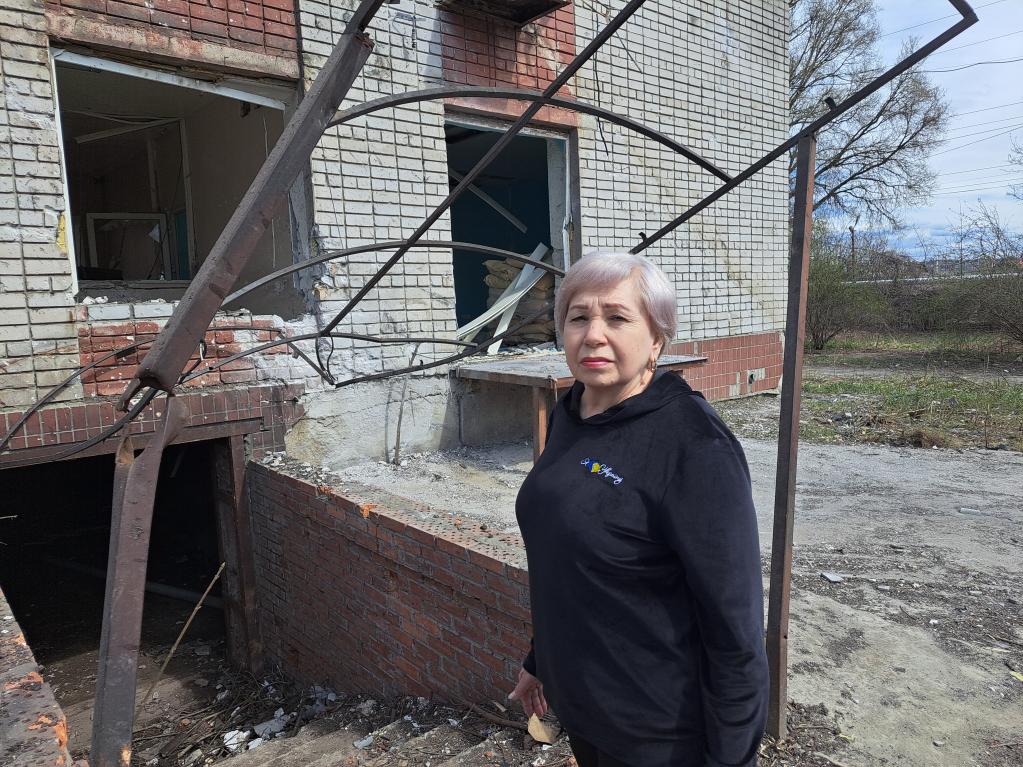
Story
22 May 2024
Humanitarians’ resilience amid Ukraine’s ongoing war
As the war in Ukraine continues to exacerbate the humanitarian situation, local aid workers are helping people in places where humanitarian needs are dire, and the security situation is perilous. For more than a decade, humanitarians have risked their lives while their own families bear the brunt of the impact of war. Iryna: Navigating humanitarian challengesChernivtsi Region, western Ukraine "When we start a humanitarian project in Ukraine, the main concern is always about the safety of our workers." Iryna Chorna, 45, has been engaged in humanitarian response in Ukraine for more than 10 years. Her personal story is intertwined with the stories of many of the country’s displaced and war-affected people. Forced to flee her home twice – first from Donetsk City in 2014 and again in 2022 from Zaporizhzhia City – Iryna’s experiences fuelled her dedication to humanitarian work. "In 2014, I received humanitarian aid myself. Then I became a volunteer," she recalls. Today, she plays a pivotal role in training humanitarian workers and teams of the local humanitarian organization Posmishka UA across Ukraine. She explains: "We build the work of our teams in line with humanitarian principles. We also take the security training of our staff very seriously. Due to the situation in the country, every time we start a humanitarian project in Ukraine, our main concern is always about the lives of our workers." Since the beginning of this year, more than 30 incidents involving attacks and hostilities against humanitarian workers, facilities or vehicles have been reported by OCHA, with at least 3 aid workers killed and 11 injured. Despite the challenges, Iryna finds solace in her family, community and work. "I know I have chosen the right path in life," she says. "Together with my colleagues, we have opened over 50 child-friendly spaces, which provide relief to children across Ukraine. The gratitude and joy I see in their eyes gives me strength and inspiration to carry on."Oksana: Resilience amid personal tragedy Kharkiv Region, eastern Ukraine Oksana, a member of the local organization Humanitarian Mission Proliska, faced personal tragedy when a missile struck her home in January. As she recalls the harrowing experience, Oksana is overwhelmed with emotions: "It was really tough for me after the attack — so much pain and anger. Three months after the strike, my family and I are working to repair our home so we can have protection next winter." Oksana remains committed to her humanitarian work, helping others while rebuilding her home. "I now better understand the harsh reality people in such circumstances face; many are in much worse situations than myself. My job is to help," she says. "It’s very difficult to recover, but I have my family, my cats and dogs, and I recently adopted another pet; this helps me a lot." Dmytro: Championing well-beingDonetsk Region, eastern Ukraine"As the head of a humanitarian organization, I need to ensure that each of our staff has the capacity to cope." Dmytro Myshenin, 31, is the head of the local non-governmental organization (NGO) Angels of Salvation. It was set up two years ago and now has 348 staff, many of whom work close to the front line."With such a large number of people in the organization, we strive to take care of the well-being of each staff member," says Dmytro, who has worked as a volunteer since 2014. "Together with our team of psychologists and facilitators – 18 people altogether – we have developed programmes to support our workers. The biggest difficulty in our work is the insecurity due to constant shelling, air strikes and blackouts.” Dmytro finds strength in seeing the support his organization brings to war-affected people: "I feel joy and relief seeing our work bring results." Hanna: Adapting to daily challenges Mykolaiv Region, southern Ukraine "All people hope they will not be left alone in peril." Hanna, a lawyer turned humanitarian worker, leads a regional team for the NGO Right to Protection, in the southern regions of Kherson, Mykolaiv and Odesa, assisting internally displaced and war-affected people.She acknowledges that stress, fatigue and burnout are daily realities for aid workers. "People's internal resources are not limitless," she says. "Too often, humanitarian workers push themselves beyond their limits to help those in need."Hanna admits that she sometimes neglects her well-being while confronting blatant human rights violations. But she believes these challenges allow her to grow personally and professionally. Hanna's team regularly meet staff psychologists to develop their coping mechanisms. “Some situations are truly heart-wrenching,” she reflects. "One instance is when a colleague chose to come and help people affected by the shelling that also claimed the lives of his relatives." Despite the conflict’s toll, Hanna draws strength from her team and the impact they have on those they serve. "All people hope they will be supported in peril, and I’m glad I can share my strength and help the vulnerable," she says. Lyudmyla: Finding strength in making a difference Sumy Region, northern Ukraine"Making a difference in people’s lives fills me with the greatest strength and inspiration." Lyudmyla, 37, joined local NGO Rokada as a humanitarian worker in the Sumy Region when the full-scale invasion started. "I just couldn't pass by seeing the struggle of people around me," she says. Like many other regions in Ukraine, Sumy is a place of uncertainty and hardship. Lyudmyla explains: "People are fleeing areas of intense attacks, often arriving with nothing more than they were wearing, lacking essentials such as kitchenware or medication."The work is intense, and humanitarians need to listen to people’s grievances and seek the best solutions. "There are moments when you return home and crave solitude," she adds. "But I manage my stress, find solace and satisfaction in my work and receive support from our psychologists." Above all, knowing that her work makes a difference for affected people gives Lyudmyla a sense of fulfilment. "People reach out to say 'Thank you, I don't know what we would have done without your help.' Such words fill me with joy and drive to continue helping others."
1 of 5
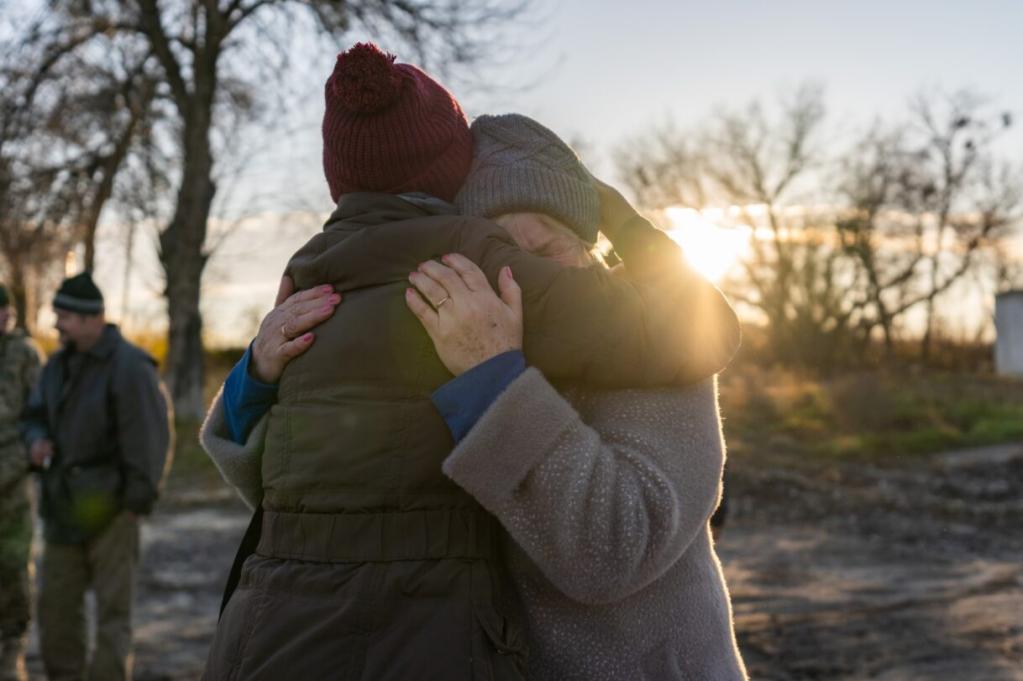
Press Release
25 July 2024
OLENIVKA: TWO YEARS SINCE THE DEADLY STRIKE THAT KILLED DOZENS OF UKRAINIAN POWS, A CONTINUED CALL FOR ACCOUNTABILITY
Prisoners of war are protected under international humanitarian law which requires their humane treatment and obligates the Detaining Power to ensure their safety. Deaths or serious injuries of POWs must be followed by an official and thorough inquiry by the Detaining Power. Any suspicion of criminal conduct must be promptly, thoroughly, independently, impartially, and transparently investigated, and those responsible must be prosecuted.Despite these obligations, the authorities of the Russian Federation took steps that impeded independent efforts to establish the facts about the explosions at Olenivka. The scene was not preserved but was instead contaminated, with physical evidence disturbed. The Russian Federation did not allow access to UN monitors, nor were any other independent expert analyses conducted. Instead, the Russian authorities declared that the strike was carried out with HIMARS rockets launched by Ukrainian armed forces.Based on interviews with more than 50 witnesses and survivors, as well as analysis of video and photographic footage, the UN Human Rights Office concluded last year that the explosions were not caused by HIMARS rockets launched by Ukrainian armed forces. While the precise type of weapon and its point of origin could not be determined, the pattern of structural damage appeared consistent with a projected ordnance having travelled on an east-to-west trajectory.The lack of accountability for the deaths and injuries at the penal colony in Olenivka fits into the broader context of widespread and routine torture of Ukrainian POWs. The Russian authorities continue to subject POWs to deplorable conditions of detention, deprive them of healthcare, and allow limited or no contact with family and the outside world.The UN Human Rights Monitoring Mission in Ukraine continues to interview Ukrainian POWs upon their return to Ukraine, and their families and reiterates its calls for truth and accountability in line with fundamental principles of international humanitarian and human rights law.UN Human Rights Office reported on Olenivka here:Treatment of prisoners of war and persons hors de combat in the context of the armed attack by the Russian Federation against Ukraine, 24 February 2022 – 23 February 2023 [24 March 2023] Paragraphs 72-76.Report on the Human Rights Situation in Ukraine, 1 February – 31 July 2023 [4 October 2023] Paragraphs 82-90.
1 of 5
Press Release
25 July 2024
FINLAND CONTRIBUTES €2 MILLION TO THE UN WORLD FOOD PROGRAMME TO SUPPORT UKRAINIAN PENSIONERS
WFP’s complementary cash assistance programme, launched in August 2023, is designed to support pensioners with low pensions who live in areas of active or possible hostilities, as defined by the State, by complementing the pensions they receive. Since August 2023, more than 360,000 pensioners have received payments from WFP under this programme. Contributions from Finland and other donors are allowing WFP to expand the programme until the end of 2024. Overall, since February 2022, Finland contributed €11 million to support WFP’s humanitarian operations in Ukraine. €1 million was used to support a joint WFP-FAO agricultural mine action programme to help rural families and small farmers safely restart food production in the Kharkiv region, and €8 million were used to provide food assistance to communities living near the frontline as well as cash assistance to the most vulnerable around the country."By providing flexible funds, Finland continues to demonstrate its commitment to principled humanitarian assistance while enabling us to support Ukrainians who need it most, to kickstart new initiatives and cover funding gaps,” said Richard Ragan, WFP Country Director in Ukraine. “We are deeply grateful to the Government of Finland for their constant support to our humanitarian programmes and to the people of Ukraine”. Cash assistance is one of many ways WFP supports Ukrainians affected by the war. WFP also distributes food boxes in areas closest to the frontline, where food is hard to find or very expensive, supports national school feeding programme, and supports the safe release of mined agricultural land in the Kharkiv region to help farmers and food producers resume work. WFP also chartered 25 vessels to export Ukrainian grain to countries in need through the Black Sea Grain Initiative and the Grain From Ukraine Initiative.The United Nations World Food Programme is the world’s largest humanitarian organization, saving lives in emergencies and using food assistance to build a pathway to peace, stability and prosperity for people recovering from conflict, disasters and the impact of climate change.Follow us on Twitter @wfp_media @WFPUkraineFor more information please contact:
Antoine Vallas, WFP/Kyiv, +380 952501154 antoine.vallas@wfp.org
Nataliia Nychai, WFP/Kyiv +380 664493921 nataliia.nychai@wfp.org
Antoine Vallas, WFP/Kyiv, +380 952501154 antoine.vallas@wfp.org
Nataliia Nychai, WFP/Kyiv +380 664493921 nataliia.nychai@wfp.org
1 of 5
Press Release
17 July 2024
Statement attributable to the Spokesperson for the Secretary-General - marking the tenth anniversary of the MH17 tragedy
In full solidarity with the families of the victims and in honour of their memory, the Secretary-General renews his call on all States to extend their full cooperation pursuant to Security Council resolution 2166 that was adopted in 2014, to ensure that those responsible are held to account, following the important work of the independent Joint Investigation Team.Stéphane Dujarric, Spokesman for the Secretary-GeneralNew York, 17 July 2024
1 of 5
Press Release
23 July 2024
UN Ukraine chief, Denise Brown, met representatives of the LGBTQI+ community in Kyiv
The gathering was an important step to discuss challenges and solutions to involve representatives of the LGBTQI+ community in humanitarian response, as well as in decision-making, advocacy, ending discrimination and promoting inclusivity.“No talks about us without us,” – says the representatives of the community that have been facing enormous challenges in accessing life-saving support such as protection from violence, housing and experiencing social isolation, discrimination in the education and job market, health issues with a low level of support from the healthcare system.21 local and national LGBTIQ+-led NGOs were involved in preparing the overview of the mentioned challenges, but the most important recommendations and solutions for how to tackle them, including:Creation of a technical working group under the Protection Cluster for LGBTIQ+ inclusion in humanitarian response.Ensuring inclusivity in humanitarian assistance, taking into account the needs of LGBTIQ+ people and their families.Advocating for inclusive legislation and legislation that aims to protect vulnerable communities.Supporting healthcare, educational, vocational programmes for LGBTIQ+ and LGBTIQ+-led businesses.The UN and the Humanitarian community are committed to working with them and joining forces to build an inclusive and secure future for Ukraine.
1 of 5
Press Release
08 July 2024
Ukraine: Türk deplores wave of strikes killing dozens of civilians, including women and children at hospitals
The attacks also struck two of the country’s main hospitals for children and women in Kyiv, as well as key energy infrastructure. Authorities in Ukraine reported that at least 34 people were killed and 127 injured.“Shockingly, one of the strikes severely damaged the intensive care, surgical and oncology wards of Okhmatdyt, which is Ukraine’s largest children’s referral hospital, and destroyed its children’s toxicology department, where children receive dialysis,” said the High Commissioner for Human Rights. “Among the victims were Ukraine’s sickest children."“My team visited the site shortly after the attack and observed children receiving treatment for cancer in hospital beds set up in parks and on streets, where medical workers had quickly established triage areas, amongst chaos, dust and debris.”Health officials said the entire hospital was now without electricity, preventing the use of ventilators and other urgent care. It was not immediately clear how many people were killed in the strike.UN Human Rights staff also witnessed a massive outpouring of solidarity from local residents, who rushed to the scene with blankets, water and food to assist the patients and staff, said Türk, adding they had to leave the site after renewed explosions in the city.Also in Kyiv, at least seven civilians were killed at the ISIDA medical centre – one of the largest women's health and family planning centres in Ukraine – by the secondary effects of a missile that was intercepted above the facility.“This is abominable, and I implore those with influence to do everything in their power to ensure these attacks stop immediately,” he said. “Civilians must be protected, and the laws of war strictly adhered to.“There must be prompt, thorough and independent investigations into these latest grave attacks on civilians and civilian infrastructure, and those responsible must be held to account.”
1 of 5
Latest Resources
1 / 11
Resources
26 March 2024
1 / 11

